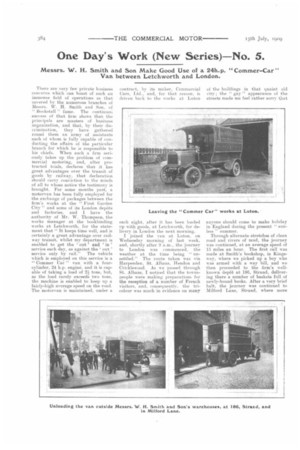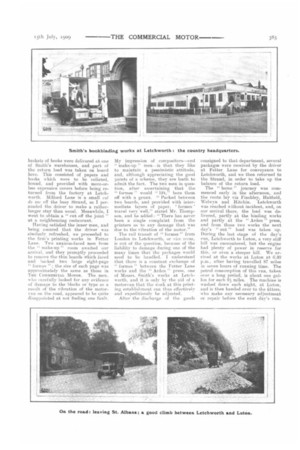One Day' s Work (New Series)—No. 5.
Page 2

Page 3

If you've noticed an error in this article please click here to report it so we can fix it.
There are very few private business concerns which can boast of such an immense field of operations as that covered by the numerous branches of Messrs. W. H. Smith and Son, of " Bookstall " fame. The continued success of that firm shows that the principals are masters of business organization, and that, by their discrimination, they have gathered round them an army of assistants each of whom is fully capable of conducting the affairs of the particular branch for which he is responsible to his chiefs. When such a firm seriously takes up the problem of commercial motoring, and, after protracted trials, declares that it has great advantages over the transit of goods by railway, that declaration should carry conviction to the minds of all to whose notice the testimony is brought. For some months past, a motorvan has been fully employed for the exchange of packages between the firm's works at the " First Garden City " and some of its London depots and factories, and I have the authority of Mr. W. Thompson, the works manager at the bookbinding works at Letchworth, for the statement that " It keeps time well, and is certainly a great advantage over railway transit, whilst my department is enabled to get the ' out ' and in ' service each day, as against the out' service only by rail." The vehicle which is employed on this service is a " Commer Car" van with a fourcylinder, 24 h.p. engine, and it is capable of taking a load of 2-1,tons, but, as the load rarely exceeds two tons, the machine is enabled to keep up a fairly-high average speed on the road. The motorvan is maintained, under a
contract, by its maker, Commercial Cars, Ltd., and, for that reason, is driven back to the works at Luton
each night, after it has been loaded up with goods, at Letchworth, for delivery in London the next morning.
I joined the van at Luton, on Wednesday morning of last week, and, shortly after 9 a.m., the journey to London was commenced, the weather at the time being " unsettled." The route taken was via Harpenden. St. Albans, Hendon and Cricklewood. As we passed through St. Albans, I noticed that the townspeople were making preparations for the reception of a number of French visitors, and, consequently, the tricolour was much in evidence on many of the buildings in that quaint old city ; the " gay " appearance of the streets made me feel rather sorry that anyone should come to make holiday in England during the present " sunless " summer.
Through alternate stretches of clean road and rivers of mud, the journey was continued, at an average speed of 1.5 miles an hour. The first call was made at Smith's bookshop, in Kingsway, where we picked up a boy who was armed with a way bill, and we then proceeded to the firm's wellknown depOt at 186, Strand, delivering there a number of baskets full of newly-bound books. After a very brief halt, the journey was continued to Milford Lane, Strand, where more baskets of books were delivered at one of Smith's warehouses, and part of the return load was taken on board here. This consisted of papers and books which were to be collated, bound, and provided with more-orless expensive covers before being returned from the factory at Letchworth. Milford Lane is a small rid de sae off the busy Strand, so I persuaded the driver to make a ratherlonger stay than usual. Meanwhile, I went to obtain a " cut off the joint" at a neighbouring restaurant.
Having satisfied the inner man, and being assured that the driver was similarly refreshed, we proceeded to the firm's printing works in Fetter Lane. Two anxious-faced men from the " make-up " room awaited our arrival, and they promptly proceeded to remove the thin boards which faced and backed two large eight-page " formes " ; the size of each page was approximately the same as those in THE COMMERCIAL Moine. The men, who carefully looked for any evidence of damage to the blocks or type as a result of the vibration of the motorvan on the road, appeared to he quite disappointed at not finding one fault. My impression of compositors—and
" make-up" men---is that they like to maintain a pessimistic attitude, and, although appreciating the good points of a scheme, they are loath to admit the fact. The two men in question, after ascertaining that the " formes " would "lift,'' bore them off with a grunt. " Parked between two boards, and provided with inter mediate layers of paper, formes ' travel very well," stated Mr. Thompson, and he added: "There has never been a single complaint from the printers as to any damage that was due to the vibration of the motor."
The rail transit of " formes " from London to Letchworth, or rice versa, is out of the question, because of the liability to damage during one of the many times that the packages would need to be handled. I understand that there is a constant exchange of " formes " between the Fetter Lane works and the " Arden " press. one of Messrs. Smith's works at Letchworth, and it is only by the aid of a motorvan that the work at this printing establishment can thus effectively and expeditiously be adjusted. After the discharge of the goods consigned to that department, several packages were received by the driver at Fetter Lane for conveyance to Letchworth, and we then returned to the Strand, in order to take up the balance of the return load.
The " home " journey was commenced early in the afternoon, and the route lay via Finchley, Hatfield, Welwyn and Hitchin. Letchworth was reached without incident, and, on our arrival there, the load was delivered, partly at the binding works and partly at the " Arden " press, and from these two works the next day's " out " load was taken up. During the last stage of the day's run, Letchworth to Luton, a very stiff hill was encountered, hut the engine had plenty of power in reserve for this, or even a steeper hill. We arrived at the works at Luton at 6.30 p.m., after having travelled 87 miles in seven hours of running time. The petrol consumption of this van, taken over a long period, is about one gallon for each 94 miles. The machine is washed down each night, at Luton, and is then handed over to the fitters, who make any necessary adjustment or repair before the next day's run.




















